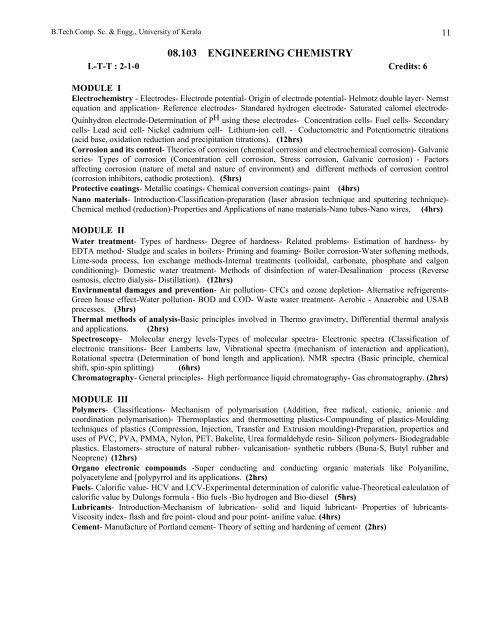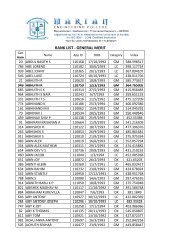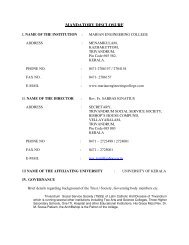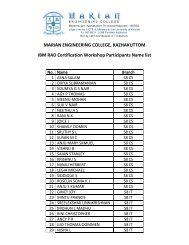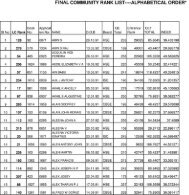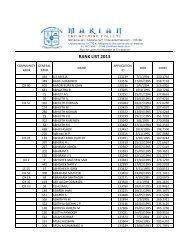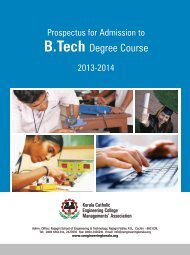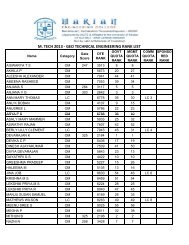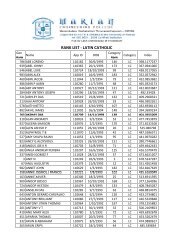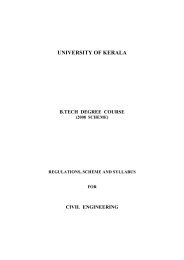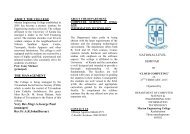UNIVERSITY OF KERALA - Marian Engineering College
UNIVERSITY OF KERALA - Marian Engineering College
UNIVERSITY OF KERALA - Marian Engineering College
You also want an ePaper? Increase the reach of your titles
YUMPU automatically turns print PDFs into web optimized ePapers that Google loves.
B.Tech Comp. Sc. & Engg., University of Kerala 11<br />
08.103 ENGINEERING CHEMISTRY<br />
L-T-T : 2-1-0 Credits: 6<br />
MODULE I<br />
Electrochemistry - Electrodes- Electrode potential- Origin of electrode potential- Helmotz double layer- Nernst<br />
equation and application- Reference electrodes- Standared hydrogen electrode- Saturated calomel electrode-<br />
Quinhydron electrode-Determination of P H using these electrodes- Concentration cells- Fuel cells- Secondary<br />
cells- Lead acid cell- Nickel cadmium cell- Lithium-ion cell. - Coductometric and Potentiometric titrations<br />
(acid base, oxidation reduction and precipitation titrations). (12hrs)<br />
Corrosion and its control- Theories of corrosion (chemical corrosion and electrochemical corrosion)- Galvanic<br />
series- Types of corrosion (Concentration cell corrosion, Stress corrosion, Galvanic corrosion) - Factors<br />
affecting corrosion (nature of metal and nature of environment) and different methods of corrosion control<br />
(corrosion inhibitors, cathodic protection). (5hrs)<br />
Protective coatings- Metallic coatings- Chemical conversion coatings- paint (4hrs)<br />
Nano materials- Introduction-Classification-preparation (laser abrasion technique and sputtering technique)-<br />
Chemical method (reduction)-Properties and Applications of nano materials-Nano tubes-Nano wires. (4hrs)<br />
MODULE II<br />
Water treatment- Types of hardness- Degree of hardness- Related problems- Estimation of hardness- by<br />
EDTA method- Sludge and scales in boilers- Priming and foaming- Boiler corrosion-Water softening methods,<br />
Lime-soda process, Ion exchange methods-Internal treatments (colloidal, carbonate, phosphate and calgon<br />
conditioning)- Domestic water treatment- Methods of disinfection of water-Desalination process (Reverse<br />
osmosis, electro dialysis- Distillation). (12hrs)<br />
Envirnmental damages and prevention- Air pollution- CFCs and ozone depletion- Alternative refrigerents-<br />
Green house effect-Water pollution- BOD and COD- Waste water treatment- Aerobic - Anaerobic and USAB<br />
processes. (3hrs)<br />
Thermal methods of analysis-Basic principles involved in Thermo gravimetry, Differential thermal analysis<br />
and applications. (2hrs)<br />
Spectroscopy- Molecular energy levels-Types of molecular spectra- Electronic spectra (Classification of<br />
electronic transitions- Beer Lamberts law, Vibrational spectra (mechanism of interaction and application),<br />
Rotational spectra (Determination of bond length and application). NMR spectra (Basic principle, chemical<br />
shift, spin-spin splitting) (6hrs)<br />
Chromatography- General principles- High performance liquid chromatography- Gas chromatography. (2hrs)<br />
MODULE III<br />
Polymers- Classifications- Mechanism of polymarisation (Addition, free radical, cationic, anionic and<br />
coordination polymarisation)- Thermoplastics and thermosetting plastics-Compounding of plastics-Moulding<br />
techniques of plastics (Compression, Injection, Transfer and Extrusion moulding)-Preparation, properties and<br />
uses of PVC, PVA, PMMA, Nylon, PET, Bakelite, Urea formaldehyde resin- Silicon polymers- Biodegradable<br />
plastics. Elastomers- structure of natural rubber- vulcanisation- synthetic rubbers (Buna-S, Butyl rubber and<br />
Neoprene) (12hrs)<br />
Organo electronic compounds -Super conducting and conducting organic materials like Polyaniline,<br />
polyacetylene and [polypyrrol and its applications. (2hrs)<br />
Fuels- Calorific value- HCV and LCV-Experimental determination of calorific value-Theoretical calculation of<br />
calorific value by Dulongs formula - Bio fuels -Bio hydrogen and Bio-diesel (5hrs)<br />
Lubricants- Introduction-Mechanism of lubrication- solid and liquid lubricant- Properties of lubricants-<br />
Viscosity index- flash and fire point- cloud and pour point- aniline value. (4hrs)<br />
Cement- Manufacture of Portland cement- Theory of setting and hardening of cement (2hrs)


